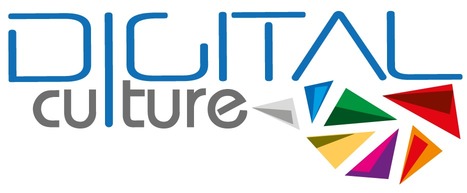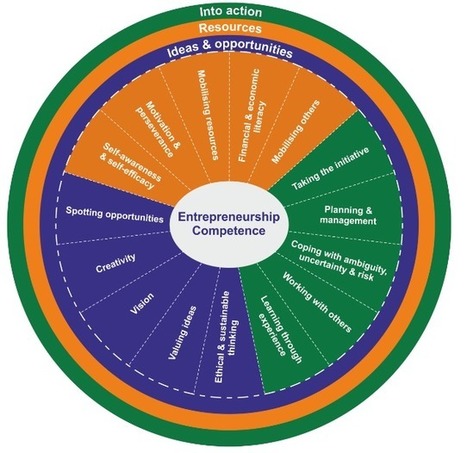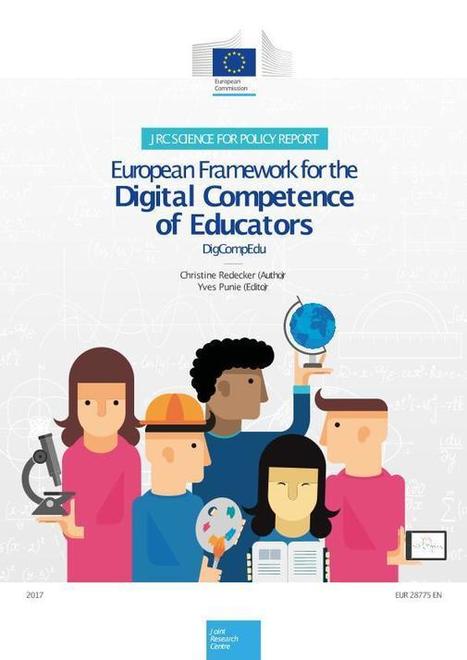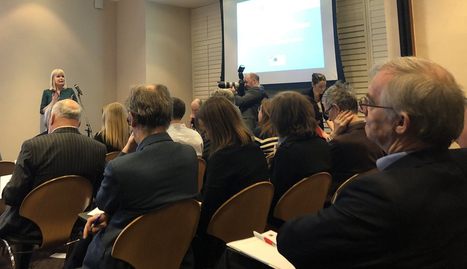Get Started for FREE
Sign up with Facebook Sign up with X
I don't have a Facebook or a X account

 Your new post is loading... Your new post is loading...
 Your new post is loading... Your new post is loading...
Current selected tag: 'EU'. Clear
Entrepreneurship may be mistakenly related only to economic activities and business creation, however, it is much more than that. ‘Sense of initiative and entrepreneurship’ is one of the eight key competences for lifelong learning defined by the European Union. It is refers to an individual's ability to identify and seize opportunities, turn ideas into action, and to plan and manage processes to achieve objectives. In this tutorial you can find out more about this key competence and how teachers can foster it in their students.
As the teaching professions face rapidly changing demands, educators require an increasingly broad and more sophisticated set of competences than before. In particular the ubiquity of digital devices and the duty to help students become digitally competent requires educators to develop their own digital competence. On International and national level a number of frameworks, self-assessment tools and training programmes have been developed to describe the facets of digital competence for educators and to help them assess their competence, identify their training needs and offer targeted training.
Equipping European citizens with digital competences is at the core of the EU strategy: in 2006 the European Parliament recognized Digital Literacy as one of the eight key competences that every European citizen should master [1] and as one of the four foundational skills for learning. Further, enhancing Digital Literacy is one of seven pillars in the European Commission’s 2010 Digital Agenda for Europe. In the words of Androulla Vassiliou, the former European Commissioner for Education, Culture, Multilingualism, Youth and Sports - “we need to rethink what kind of literacy tomorrow’s Europe needs" [2]. 
Gareth Morgan's curator insight,
February 26, 2015 4:54 AM
Digital Competency was a major headline in the recent Prof Donaldson report on the curriculum and assessment in Wales. The documents here could be useful?
Ever wondered what happens to your online personal data? Find out what the EU is doing to simplify our online privacy rights and safeguard citizens against data abuses. |
By Professor Grainne Conole.
I recently attended a HEA Future-focus Forum on Digital Transformation and Empowering Technologies in Higher Education. Prior to the meeting a paper was circulated setting the scene for the meeting. This contextualized the topic by referencing various Irish and EU relevant documents, including the Irish Future Jobs Initiative, the Digital Agenda for Europe, the European Digital Education Action Plan, the European Higher Education Area in 2018, etc.
The paper argued that digital transformation is pervasive and can be understood as the changes that digital technology causes or influences in all aspects of human life. In addition, Higher Education will change significantly over the coming years due to digital transformation. Critical questions include: how can higher education Institutions (HEI) provide leadership in ensuring an ethical and responsible use of technology and data? How do we empower people to build a data-first culture and future proof our digital infrastructure? What are the challenges and how do we prepare for them? What international best practice exists to inform a national approach to digital transformation in Higher Education?
With European elections coming up in May 2019, you probably want to know how the European Union impacts your daily life, before you think about voting. In the latest in a series of posts on what Europe does for you, your family, your business and your wellbeing, we look at what Europe does for people wanting to gain digital skills.
Digital Competence has become a hot topic, especially for school education. While schools are still struggling with the digital infrastructure, students are already using digital technologies widely, for life and leisure, but also to support their learning - whether or not this is foreseen in curricula. Students' life is a digital life. Schools, teachers and education ministries are aware of this and are increasingly focusing on developing curricula, guidelines or materials to ensure that students use technology creatively and critically, effectively, meaningfully and responsibly. As programmes focusing on students' digital competence are taking off, the call for equipping teachers – or more generally: educators at all levels – with digital skills is getting louder. But what are the digital competences educators need to have? Are we talking about dealing with digital devices or compiling digital learning resources? Are we talking about technical skills or pedagogical competences? What is it that makes an educator – as educator – digitally competent? The European Framework for the Digital Competence of Educators (DigCompEdu) intends to answer these questions. And its answer is easy: Yes, educators do need to have a good level of overall digital competence (as captured for example in the 'DigComp' general Digital Competence Framework for Citizens), because they are citizens in a digital age and role models for the next generation. However, to be digitally competent educators, they need a specific set of competences that focuses on their professional activities. 5 Via Miloš Bajčetić, Mark E. Deschaine, PhD
To read the long version of the EPRS Briefing go to: New global interactive strategies for teaching and learning The world of education is currently undergoing massive transformation as a result of... |










![People wanting to gain digital skills [What Europe does for you] | Information and digital literacy in education via the digital path | Scoop.it](https://img.scoop.it/RizM25ZpFTsgWR0_K9_jETl72eJkfbmt4t8yenImKBVvK0kTmF0xjctABnaLJIm9)






